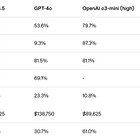Vibecoding
The latest trend in AI is "vibecoding," and it's being covered from Substack to the New York Times. It's a practice of using LLMs to code that enables non-programmers to build their own software.
Between the lines:
AI coding tools are getting good enough that even those with a passing knowledge of software can go from an idea description to a working prototype in minutes to hours.
While the trend democratizes software development, it raises questions about the nature of software development and the broader displacement of white-collar work.
And as we've discussed before, it also brings a new worry for programmers: that new junior devs don't fundamentally understand the work they're producing.
Elsewhere in vibecoding:
The WSJ dives deeper into AI-enabled coding's impacts, with some companies seeing 10-20% efficiency gains in software development.
A quarter of Y Combinator's latest batch have codebases that are at least 95% generated by AI.
And Azeem Azhar goes beyond vibecoding to coin a new term: the "vibe worker."
Agent v Agent
Microsoft launched new AI "sales agents" to compete with Salesforce's Agentforce in a new battle between tech giants to dominate the AI-powered business tools market.
The big picture:
Microsoft is adding both a Sales Agent and Sales Chat, with the Sales Agent working autonomously to qualify leads while Sales Chat helps accelerate deal cycles.
The tools allow companies to bypass traditional CRM interfaces (like Salesforce) entirely; Salesforce CEO Marc Benioff, for his part, has called Microsoft a mere "reseller of OpenAI."
Ultimately, both companies share a similar vision of AI agents - between Agentforce and Microsoft 365, both companies are already signing up thousands of companies for "agent workflows."
Elsewhere in the FAANG free-for-all:
Apple is introducing AI-generated summaries of app reviews in the App Store for US users with the latest iOS and iPadOS 18.4 betas.
Google is rolling out an experimental AI Mode in Search that allows subscribers to ask complex, multi-part questions.
And Amazon may be developing a hybrid reasoning AI model under its Nova moniker, aiming for a more cost-efficient solution versus competitors.
Elsewhere in AI agents:
OpenAI is reportedly planning tiered AI agent pricing ranging from $2,000 to $20,000 per month for different complexity levels of knowledge work.
Amazon has established a new agentic AI group within AWS, led by a former AWS executive.
And Anthropic is using Claude's Pokémon gameplay to study and refine its AI agents' behavior and capabilities.
Digital deportation
The State Department is launching an AI-assisted program called "Catch and Revoke" to identify and cancel visas of foreign nationals who appear to support Hamas on social media.
Why it matters:
The DOGE has reportedly been looking to AI assistance in its "streamlining" efforts, but this marks a major change in the US government's use of AI (and a major expansion of surveillance technology).
The program will scan tens of thousands of student visa holders' social media posts for signs of pro-Hamas content since October 7th.
While framed as a national security measure, critics warn that it could chill free speech and disproportionately impact certain communities.
Elsewhere in AI geopolitics:
The UK CMA has cleared Microsoft's $13B investment in OpenAI, though it did note Microsoft gained "material influence."
California State Senator Scott Wiener has introduced SB 53, a new bill aimed at protecting AI lab whistleblowers - it follows his earlier AI safety bill, SB 1047.
China has instructed its leading AI executives to avoid US travel due to concerns about information security and potential detentions.
And the US Department of Labor is investigatng Scale AI regarding Fair Labor Standards Act compliance.
Elsewhere in AI anxiety:
A TollBit analysis reveals that AI search engines generate 96% less referral traffic than Google Search.
In a new policy paper, notable tech leaders, including Eric Schmidt, argue against pursuing a "Manhattan Project" for AGI.
Google and Amazon's AI systems have controversially described Hitler's manifesto as "a true work of art" in their responses.
And judges are increasingly frustrated with AI-generated legal citations as lawyers submit briefs containing hallucinated court cases.
Things happen
Reinforcement learning pioneers win the 2024 Turing Award. Deutsche Telekom and Perplexity are working on an AI Phone. Pinterest is building tools to label AI-generated content. Some parents are teaching their children how to use AI chatbots. A look at ALERTCalifornia, a program using AI-equipped cameras to monitor natural disasters. US government plan to cut AI contracts imperils Booz Allen Hamilton. DeepSeek reveals theoretical margin on its AI models is 545%. Larry Page forms new company to use LLMs for optimized designs. OpenAI unveils NextGenAI consortium and commits $50M in grants. DuckDuckGo's AI answers are out of beta. Mistral launches a new OCR model. Sergey Brin says Google could reach AGI if employees worked harder. NYC subway used Google's AI-based tool to identify track defects. Training your AI replacement one keystroke at a time. The differences between Deep Research, Deep Research, and Deep Research. Former OpenAI researcher criticizes company for rewriting its AI safety history. Anthropic's valuation triples to $61.5B in bumper AI funding round. Alibaba releases open-source reasoning model QwQ-32B. Sesame exits stealth with AI speech model and plans for AI glasses. OpenAI says Sora is now available to ChatGPT Plus and Pro users in Europe. Q&A with ex-White House AI adviser on Biden administration and AGI. Anthropic quietly removes Biden-era AI policy commitments from its website. An in-depth look at Apple's AI crisis. LA Times removes AI-powered feature after it tried to defend the KKK. Ilya Sutskever reportedly isn't developing advanced AI using OpenAI's methods. How AI could upend the economy. Smaller, powerful models raise questions about first-mover advantage in LLMs. Musk's fight with OpenAI set for expedited trial this year.






